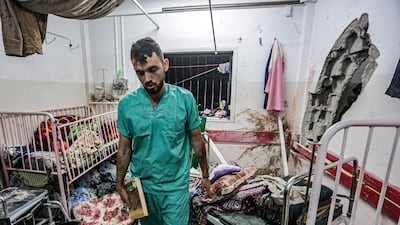Live updates: Follow the latest from Israel-Gaza
Eight patients have died in Nasser Hospital in Khan Younis since Israel cut off electricity to the besieged complex, where 150 patients remain, Gaza's Health Ministry said.
The patients at the hospital include seven in critical condition, five undergoing dialysis treatment and three newborns, the ministry said.
There are also several patients with burns and amputated limbs, as well as paraplegics.
The ministry warned that oxygen supplies at the hospital were running out. It came after the World Health Organisation said the complex ceased operations after its team was denied access by Israeli forces who encircled the hospital.
WHO director general Dr Tedros Adhanom Ghebreyesus said his team was not given permission to enter to bring out the most critically ill and injured, “despite reaching the hospital compound to deliver fuel alongside partners”.
“At least 20 [patients] need to be urgently referred to other hospitals to receive health care … the cost of delays will be paid by patients' lives,” Dr Tedros wrote on social media platform X.
More than 29,000 Gazans have been confirmed dead, mostly women and children, since October 7, while thousands remain under rubble, amid damaged roads and security concerns.

Speaking to The National from Rafah, head of the hospital's plastic surgery department Dr Ahmad Al Moghrabi said the situation in the past few days under the Israeli siege was terrifying.
He stayed in the hospital for 118 days but was eventually forced to flee when Israeli forces raided the complex.
In his final days there, Dr Al Moghrabi said the remaining staff and patients were relying on stale bread and canned food to survive, with clean water in short supply.
“We would eat whatever we could find. We would eat once, maybe twice a day. Canned food – mostly – foul, hummus, or tuna," he said.
The UN agency for Palestinian refugees said three out of every four people in Gaza are drinking from contaminated water sources, leading to a surge in infectious diseases.
Dr Al Moghrabi is from Gaza city, but due to orders from the Israeli army during the early stages of the war, his family was forced to seek refuge in Rafah when the area in central Gaza came under attack.
He now sleeps in a tent with 25 other people. But on his first night outside of Nasser Hospital, he was forced to sleep rough on the street.
“I'm a consultant and on the first day out, I slept on the streets,” he said, pointing out that the war in Gaza has affected people of all classes and backgrounds in the enclave.
Despite his professional standing, Dr Al Moghrabi has found himself among those requiring assistance.
“We need everything, starting with warmth for our children,” he said.
He is one of the about 1.4 million Gazans who have sought safety in Rafah, on Gaza's southern border with Egypt. They are now bracing for a potential Israeli invasion of the crowded city, where they have limited access to food and water.
UNRWA spokesman Adnan Abu Hasna said that Israelis blocking the Karam Abu Salem border crossing has hindered the entry of aid into Gaza.
“The humanitarian system is on the verge of collapse unless dramatic measures or real actions are taken on the ground,” he said.

